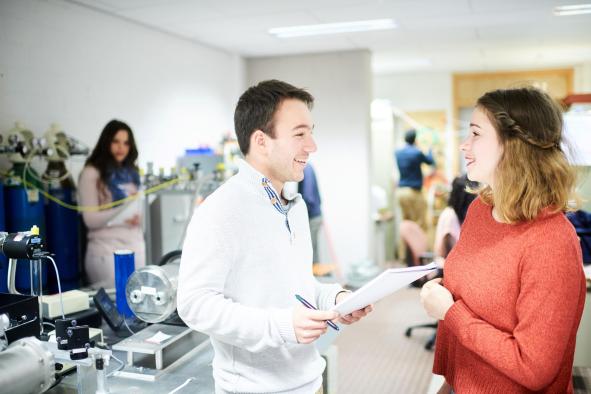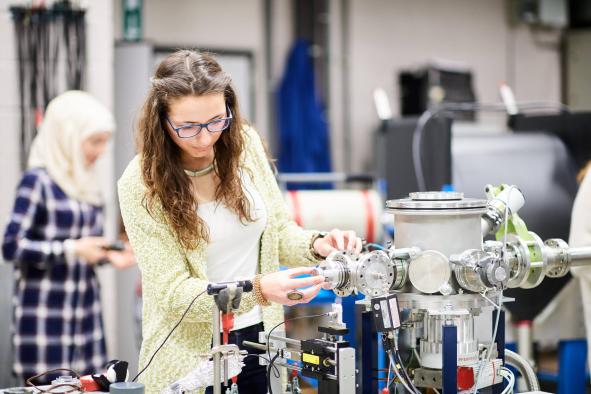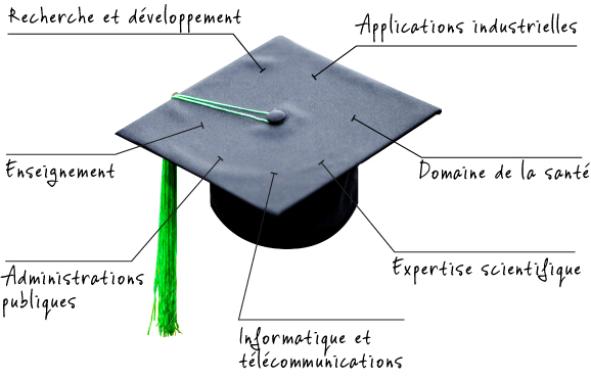Bachelor in Physics
-
Schedule
regular course
- ECTS Credits 180

Your bachelor starts with a solid grounding in general physics.
He then gradually moves on to more advanced subjects whose teaching is largely based on recent advances in research: astrophysics, quantum mechanics, electrodynamics, solid state physics, nuclear physics...
From the first year, you learn to develop experimental skills that quickly lead you to participate in the activities of the physics department's research laboratories.
In addition to physics courses, you receive rigorous training in mathematics, chemistry and computer science. You will also develop your command of English to read and write scientific articles.
A human dimension completes your bachelor's degree with a historical and philosophical approach to science.
Your bachelor's training is both wide-ranging and high-level. It provides ideal preparation for master's studies in physics in Namur or elsewhere in Europe.

You're off to a good start
- you're curious and enthusiastic about the phenomena that surround you;
- you're at ease with mathematics and science;
- you're rigorous and precise;
- you're good at synthesizing.
Teaching methods
Courses, exercise sessions, practical work, individual and group projects, innovative pedagogies, everything is done to ensure that you master the concepts.
Lectures are illustrated by experiments, multimedia animations, videos... and supported by course materials (books, syllabuses...).
Organized in small groups, practical work and exercise sessions introduce you to the rigor and techniques specific to each discipline under the supervision of an assistant.
To make and interpret measurements, you'll learn to work in a laboratory environment, using precision equipment and specific high-performance teaching aids. In this way, you observe, experimentally, certain laws or phenomena exposed in the more theoretical lessons.
Many teachers have set up "flipped classes". You learn theory at home, and active, interactive teaching is provided in the auditorium!
In your first bachelor's block, you take part in a general physics research "mini-project" in which you intervene as young researchers to find a creative answer to a challenge in which technology plays an important role.

Finally, the teachers are keen to remain available to answer your questions and help you improve.
Success aids
Succeeding in a year of study at university involves many challenges.
To help you meet them, we support you in developing your disciplinary, methodological and human skills... with the support of numerous professionals.
Preparatory courses, individualized help... Find out more about the schemes set up for your training.
After the baccalauréat: the master's degree
The University of Namur is organizing:
- the master 120 in physical sciences
- the master 60 in physical sciences
- the master in physics education
- 120 credits - section 4 (from 2025)
- 60 credits - section 5 (from 2025)
directly accessible after obtaining your bachelor's degree in physical sciences.
-
<unknown>
-
<unknown>
Code Name Staff Th.+Ex. Credits/Block 1 2 3 SPHYB206_P36750 <unknown> Henrard Luc 30h th. + 15h ex. 5 SPHYB210 Mathematical physics I Olivier Yoann 40h th. + 25h ex. 5 SPHYB211 Analytical mechanics Caudano Yves 45h th. + 45h ex. 7 SPHYB301 Quantum Mechanics II Caudano Yves Fuzfa André Olivier Yoann HERMAN Nicolas 45h th. + 30h ex. 6 SPHYB306 Course of Special and General Relativity MAYER Alexandre MAYER Alexandre 30h th. 3 SPHYB311 Analytical methods for solving problems in physics Deparis Olivier 22h th. + 15h ex. 3 SPHYB319 Quantum mechanics and statistical physics of many-body systems Houssiau Laurent Houssiau Laurent 22.5h th. + 15h ex. 3 -
<unknown>
Code Name Staff Th.+Ex. Credits/Block 1 2 3 SMATB335_P36751 <unknown> Fuzfa André 15h th. + 15h ex. 3 SMATB108 Ordinary differential equations Carletti Timoteo 15h th. + 7.5h ex. 2 SMATB102_P35428 Real analysis II Winkin Joseph 30h th. + 30h ex. 5 SMATB103_P35430 Actual analysis Winkin Joseph 30h th. + 30h ex. 5 SMATB101_P35432 Linear algebra I Mauroy Alexandre 30h th. + 30h ex. 4 SMATB107_P35434 Algebra and analytical geometry Fuzfa André 30h th. + 30h ex. 4 SMATB203 Calcul différentiel et intégral II Carletti Timoteo 22.5h th. + 30h ex. 5 SMATB312 Statistics Van Bever Germain Franco Nicolas 30h th. + 15h ex. 3 -
<unknown>
Code Name Staff Th.+Ex. Credits/Block 1 2 3 SPHYB127 Méthodes de calcul Louette Pierre 15h th. + 15h ex. 2 SPHYB128 Introduction to scientific computing Debarsy Paul-Louis 15h th. + 30h ex. 3 SPHYB208 Programmation Henrard Luc Guillaume Emerick 15h th. + 45h ex. 4 -
<unknown>
Code Name Staff Th.+Ex. Credits/Block 1 2 3 SCHIB111_P35312 General chemistry Wouters Johan 30h th. + 15h ex. 3 SCHIB112_P36776 General chemistry of solutions Dehon Jérémy 25h th. + 10h ex. 3 SCHIB207_P35447 Introduction to radiocristallography, mineralogy and petrology Yans Johan Wouters Johan 15h th. + 15h ex. 2 SCHIB220 Physical chemistry Liégeois Vincent 30h th. 3 SCHIB210 Introduction to organic materials Berionni Guillaume Collin Stéphane 15h th. 2 -
<unknown>
Code Name Staff Th.+Ex. Credits/Block 1 2 3 SPHYB333 Introduction to didactics 30h th. 3 SBIOB219 Biology Messiaen Johan 30h th. 3 SGOLB313_P33839 Geophysics Louette Pierre Collinet Max 15h th. + 15h ex. 3 SGOGB314_P36479 Physical Partim : Climatology Houssiau Laurent 30h th. 3
-
-
<unknown>
Code Name Staff Th.+Ex. Credits/Block 1 2 3 SSPSB101 Philosophical questions Sartenaer Olivier Modera Astrid 22.5h th. + 7.5h ex. 2 Translated with DeepL.com (free version)SSPSB102 Religious Studies: Anthropology, Metaphysics and Science Leyens Stéphane Cazalis Roland 30h th. 2 -
<unknown>
Code Name Staff Th.+Ex. Credits/Block 1 2 3 SSPSB204 Logic and argumentation Sartenaer Olivier Sartenaer Olivier 22.5h th. 2 SSPSB202 History of science Sartenaer Olivier 22.5h th. 2 SSPSB203 Psychology Ravez Laurent 22.5h th. 2 SSPSB308 Philosophy of science Sartenaer Olivier 15h th. 2 SSPSB309 Ethical Leyens Stéphane LAURENT Nathanaël 15h th. 2 SSPSB307 Formal logic Sartenaer Olivier 15h th. 2
-
-
<unknown>
Code Name Staff Th.+Ex. Credits/Block 1 2 3 Soft skillsSELVB105 Introduction to Scientific English (level B1 and above) Dupal Jérémie 30h th. 3 Soft skillsSELVB205 English II (level B1 and above) Dupal Jérémie 30h th. 3 Soft skillsSELVB305 English III (level B2 minimum) Dupal Jérémie 30h th. 3 -
<unknown>
Code Name Staff Th.+Ex. Credits/Block 1 2 3 SMATB243 Introduction to Space Sciences Dupal Jérémie Zimmer Carole Fuzfa André 3
-
-
<unknown>
Code Name Staff Th.+Ex. Credits/Block 1 2 3 SBIOB003 Pluridisciplinary scientific field trip Yans Johan Silvestre Frédéric Yans Johan Silvestre Frédéric 48h th. + 48h ex. 3 3
-
<unknown>
Code Name Staff Credits Hours/Quarter 1 2 SPHYB124 General physics: Mechanics HEUSKIN Anne-Catherine 8 55h th. + 30h ex. SPHYB122 Great concerns in Physics Dias De Carvalho Junior Gabriel Houssiau Laurent Colaux Julien Henrard Luc 3 15h th. 15h th. SPHYB126 General physics: Electricity Sporken Robert 8 52h th. + 36h ex. SPHYB125 General physics: Optics Lepere Muriel Dhyne Miguël 3 22h th. + 14h ex. -
<unknown>
Code Name Staff Credits Hours/Quarter 1 2 SMATB108 Ordinary differential equations Carletti Timoteo 2 15h th. + 7.5h ex. SMATB102_P35428 Real analysis II Winkin Joseph 5 30h th. + 30h ex. SMATB103_P35430 Actual analysis Winkin Joseph 5 30h th. + 30h ex. SMATB101_P35432 Linear algebra I Mauroy Alexandre 4 30h th. + 30h ex. SMATB107_P35434 Algebra and analytical geometry Fuzfa André 4 30h th. + 30h ex. -
<unknown>
Code Name Staff Credits Hours/Quarter 1 2 SPHYB127 Méthodes de calcul Louette Pierre 2 15h th. + 15h ex. SPHYB128 Introduction to scientific computing Debarsy Paul-Louis 3 7.5h th. + 15h ex. 7.5h th. + 15h ex. -
<unknown>
Code Name Staff Credits Hours/Quarter 1 2 SCHIB111_P35312 General chemistry Wouters Johan 3 30h th. + 15h ex. SCHIB112_P36776 General chemistry of solutions Dehon Jérémy 3 25h th. + 10h ex. -
<unknown>
Code Name Staff Credits Hours/Quarter 1 2 SSPSB101 Philosophical questions Sartenaer Olivier Modera Astrid 2 22.5h th. + 7.5h ex. Translated with DeepL.com (free version)SSPSB102 Religious Studies: Anthropology, Metaphysics and Science Leyens Stéphane Cazalis Roland 2 30h th. -
<unknown>
Code Name Staff Credits Hours/Quarter 1 2 Soft skillsSELVB105 Introduction to Scientific English (level B1 and above) Dupal Jérémie 3 15h th. 15h th.
-
<unknown>
Code Name Staff Credits Hours/Quarter 1 2 SPHYB229 Wave optics and introduction to photonics Lepere Muriel Leonis Sylvain 2 15h th. SPHYB230 Electronics Sporken Robert 5 30h th. + 45h ex. SPHYB221 Physics: personal project Dias De Carvalho Junior Gabriel Dias De Carvalho Junior Gabriel 3 15h th. + 15h ex. SPHYB205 Thermodynamique (thermodynamics) Houssiau Laurent 3 30h th. SPHYB207 Practical work in general physics Zanotto Laurent 3 45h ex. SPHYB209 Electrodynamics I Deparis Olivier Deparis Olivier 4 30h th. + 15h ex. Soft skillsSMATB213 Astronomie Fuzfa André DUBOIS Eve-Aline 2 7.5h th. 7.5h th. -
<unknown>
Code Name Staff Credits Hours/Quarter 1 2 SPHYB206_P36750 <unknown> Henrard Luc 5 30h th. + 15h ex. SPHYB210 Mathematical physics I Olivier Yoann 5 40h th. + 25h ex. SPHYB211 Analytical mechanics Caudano Yves 7 30h th. + 15h ex. 15h th. + 30h ex. -
<unknown>
Code Name Staff Credits Hours/Quarter 1 2 SMATB203 Calcul différentiel et intégral II Carletti Timoteo 5 22.5h th. + 30h ex. -
<unknown>
Code Name Staff Credits Hours/Quarter 1 2 SPHYB208 Programmation Henrard Luc Guillaume Emerick 4 15h th. + 15h ex. 30h ex. -
<unknown>
Code Name Staff Credits Hours/Quarter 1 2 SCHIB207_P35447 Introduction to radiocristallography, mineralogy and petrology Yans Johan Wouters Johan 2 15h th. + 15h ex. SCHIB220 Physical chemistry Liégeois Vincent 3 30h th. SCHIB210 Introduction to organic materials Berionni Guillaume Collin Stéphane 2 15h th. -
<unknown>
-
<unknown>
Code Name Staff Credits Hours/Quarter 1 2 SSPSB204 Logic and argumentation Sartenaer Olivier Sartenaer Olivier 2 22.5h th. SSPSB202 History of science Sartenaer Olivier 2 22.5h th. SSPSB203 Psychology Ravez Laurent 2 22.5h th.
-
-
<unknown>
Code Name Staff Credits Hours/Quarter 1 2 Soft skillsSELVB205 English II (level B1 and above) Dupal Jérémie 3 15h th. 15h th. -
<unknown>
Code Name Staff Credits Hours/Quarter 1 2 SMATB243 Introduction to Space Sciences Dupal Jérémie Zimmer Carole Fuzfa André 3
-
-
<unknown>
Code Name Staff Credits Hours/Quarter 1 2 SBIOB003 Pluridisciplinary scientific field trip Yans Johan Silvestre Frédéric Yans Johan Silvestre Frédéric 3 48h th. + 48h ex.
-
<unknown>
Code Name Staff Credits Hours/Quarter 1 2 SPHYB303 Electrodynamics II Deparis Olivier 5 30h th. + 15h ex. SPHYB302 Atomic and Molecular Physics Lepere Muriel Dhyne Miguël 4 30h th. + 15h ex. SPHYB305 Nuclear physics Colaux Julien 4 30h th. + 15h ex. SPHYB307 Mechanics of continuous media Deparis Olivier 3 30h th. SPHYB309 Solid state physics Henrard Luc Guillaume Emerick 4 30h th. + 30h ex. SPHYB315 Advanced physics laboratory Frising Fernande 7 60h ex. SPHYB317 Introduction to the scientific research Louette Pierre 4 96h ex. -
<unknown>
Code Name Staff Credits Hours/Quarter 1 2 SPHYB301 Quantum Mechanics II Caudano Yves Fuzfa André Olivier Yoann HERMAN Nicolas 6 45h th. + 30h ex. SPHYB306 Course of Special and General Relativity MAYER Alexandre MAYER Alexandre 3 30h th. SPHYB311 Analytical methods for solving problems in physics Deparis Olivier 3 22h th. + 15h ex. SPHYB319 Quantum mechanics and statistical physics of many-body systems Houssiau Laurent Houssiau Laurent 3 22.5h th. + 15h ex. -
<unknown>
Code Name Staff Credits Hours/Quarter 1 2 SMATB335_P36751 <unknown> Fuzfa André 3 15h th. + 15h ex. SMATB312 Statistics Van Bever Germain Franco Nicolas 3 30h th. + 15h ex. -
<unknown>
-
<unknown>
Code Name Staff Credits Hours/Quarter 1 2 SPHYB333 Introduction to didactics 3 30h th. SBIOB219 Biology Messiaen Johan 3 30h th. SGOLB313_P33839 Geophysics Louette Pierre Collinet Max 3 15h th. + 15h ex. SGOGB314_P36479 Physical Partim : Climatology Houssiau Laurent 3 30h th.
-
-
<unknown>
-
<unknown>
Code Name Staff Credits Hours/Quarter 1 2 SSPSB308 Philosophy of science Sartenaer Olivier 2 15h th. SSPSB309 Ethical Leyens Stéphane LAURENT Nathanaël 2 15h th. SSPSB307 Formal logic Sartenaer Olivier 2 15h th.
-
-
<unknown>
Code Name Staff Credits Hours/Quarter 1 2 Soft skillsSELVB305 English III (level B2 minimum) Dupal Jérémie 3 15h th. 15h th. -
<unknown>
Code Name Staff Credits Hours/Quarter 1 2 SBIOB003 Pluridisciplinary scientific field trip Yans Johan Silvestre Frédéric Yans Johan Silvestre Frédéric 3 48h th. + 48h ex.
Les métiers des physiciens

Physicists' professions
Various skills
Thanks to their general multidisciplinary training (physics, mathematics, computer science, physical chemistry, new materials...), physicists are offered a fairly wide range of careers: academic research, teaching, computer-related activities, development activities in industry and hospitals...
Tough and rigorous, with good analytical skills, excellent mathematical modeling abilities and a rich scientific culture, physicists contribute to the advancement of knowledge and the development of applications in the service of mankind.
All these high value-added skills make physicists valued professionals on the job market.
Pushing the limits of our knowledge
According to a survey of our alumni, more than half of young graduates start their professional lives with experience in scientific research, mainly in academia, in Belgium or abroad. Universities and public funds finance the completion of a PhD (usually 4 years) or grant scholarships for participation in a research program.
Other physicists pursue their investigative work at leading-edge research institutes in very specific fields (e.g. CENAERO, a center of excellence in aeronautics in Gosselies, CERN, the particle physics laboratory in Geneva, SCK-CEN, the center for the study of nuclear energy in Mol or the Royal Meteorological Institute).
Developing industrial applications
In industrial settings, physicists are also involved in the development of high-tech or highly specific products (e.g. glass treated to save energy, safer sheet metal for the automotive industry, cyclotrons for nuclear medicine, etc.). They are also found at the head of important responsibilities downstream from research and development, notably in production departments.
Informatics and telecommunications
A solid IT background makes physicists operational in IT service companies (consultancy) or in any type of user organization (bank, insurance company,
etc.). The telecommunications sector in particular calls on the expertise of physicists for their skills in optics, electronics or even information processing.
Transmitting a passion for reality
Among the activities open to physicists, teaching and the world of training in general remain very buoyant. Over 15% of our professionally active graduates communicate their passion for reality by teaching physics as well as science and mathematics in Haute École or upper secondary education.
Physics and medicine
In the hospital environment, physicists work alongside doctors: they take part in drawing up treatment plans for patients cared for by nuclear medicine; they ensure the quality control of various medical imaging equipment; they also contribute to the development of new analysis technologies.
Expert physicists
The administration calls on the expertise of physicists. They guide policies on energy, the environment, space, etc., for example by issuing opinions on research priorities.
Testimonials from former students
The research institute where I work is concerned with the composition of our atmosphere and air quality. We are developing analytical techniques for
continuous measurement of the concentration of a range of key atmospheric gases, using satellite and ground-based instruments. These activities are carried out in an international context, in collaboration with major European agencies such as ESA and EUMETSAT.Christophe - Institute of Space Aeronomy
Thanks to the work accomplished during my PhD thesis at UNamur and the encounters made, I am now a postdoctoral researcher at Lawrence Berkeley National Lab in California. My time is divided between laboratory work, analysis of results and writing articles or scientific projects. In the laboratory, the tasks to be accomplished are diverse and include both highly technical and highly specialized aspects, such as laser alignment, sample preparation and data acquisition. Analysis of results includes code development.
Frédéric - Lawrence Berkeley National Lab
At UNamur, I acquired a solid background in physics as well as a passion for optical phenomena present in living organisms, such as their staining. I am currently conducting
research into the fluorescence of beetles and butterflies. This research is interdisciplinary, enabling me to work not only with physicists, but also with biologists, chemists and engineers. The aim is to understand the influence of color on the behavior of living organisms, with a view to developing new technological applications inspired by nature.Sébastien - University of Exeter in the UK
After my thesis at UNamur, where I acquired solid multidisciplinary knowledge, I did a two-year postdoctorate at a marine biology institute in San Diego. Now I work as a corporate consultant, at all levels: market research, sales reorganization, purchasing, tender support.
Annick - H & Z